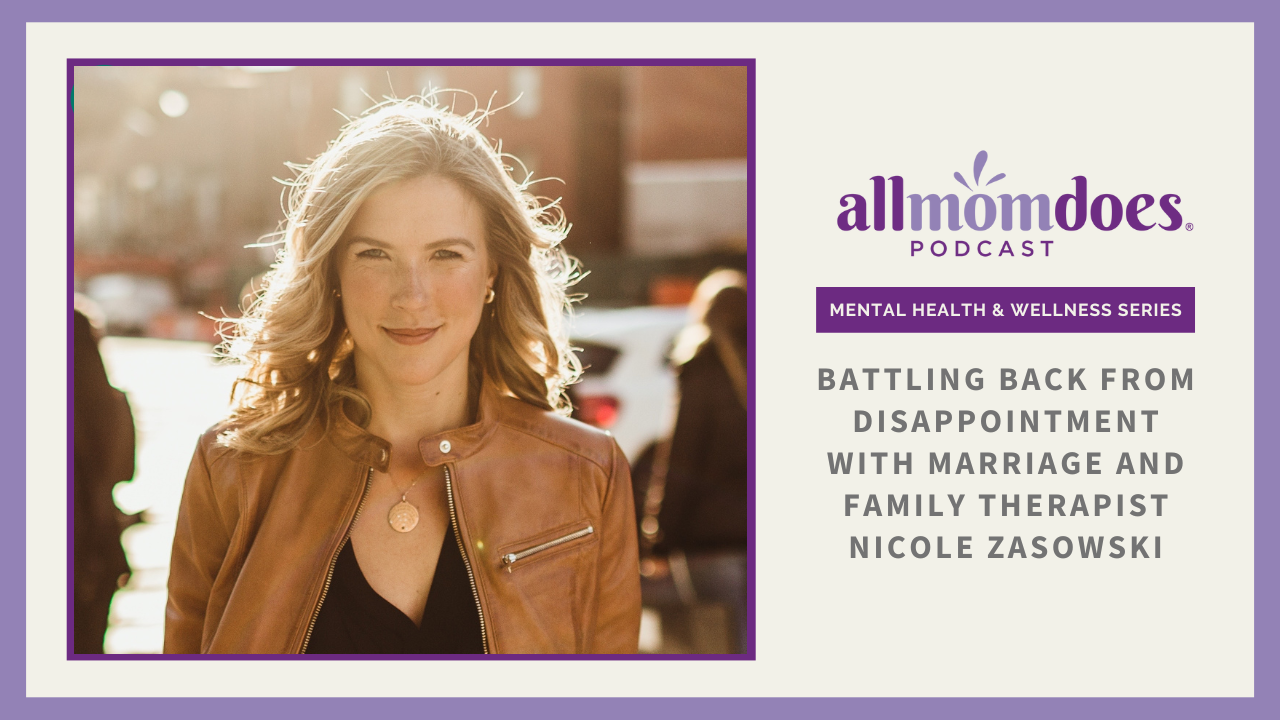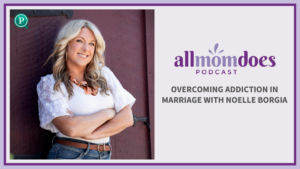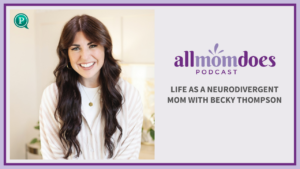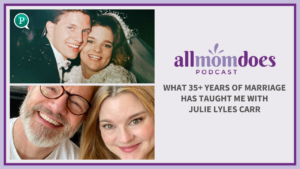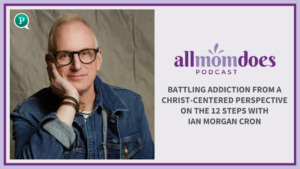It doesn’t often make the list when we think about difficult feelings to process. But disappointment can have a much deeper impact on our mental wellness than we might think.
Marriage and family therapist Nicole Zasowski joins The AllMomDoes Podcast host Julie Lyles Carr for a closer look at the experience of disappointment, how it can make us hesitant to embrace joy again, and what we can do to live well in the tension of a world and people who may disappoint us while also living with hope.
Interview Links:
- Find Nicole Online | Instagram | Facebook
- Book: What If It’s Wonderful?
Transcription:
Purposely. Your life. God’s purpose. Listen at onpurposely.com.
Julie Lyles Carr: Hey there I’m Julie Lyles Carr of the AllMomDoes podcast, where we are in a series on mental health and mental wellness. Let’s jump right into the next episode.
Today on the AllMomDoes podcast. I’m Julie Lyles Carr. We are going to talk about a topic that is, I think back over all the episodes and the seasons that we have been coming to you, the listener, I don’t know that we’ve really touched on this one. So stay tuned because this is a pretty interesting place when we think about our mental health, our mental wellness. It’s a pretty interesting topic for us to wrestle with, but I’m gonna keep it a mystery just a little bit longer. I wanna introduce you first to my guest. This is Nicole Zasowski. I am so thankful you’re here, Nicole. Thanks for joining me today.
Nicole Zasowski: Oh, my goodness. Thanks for having me. This is fun.
Julie Lyles Carr: So you’re in the Connecticut area. Tell listeners a little bit about yourself and what you do. All the stuff.
Nicole Zasowski: Yes. So I am a wife and mom to three littles. I have a six year old, a two year old and a one year old. So life is full in the best way. I’m a marriage and family therapist. I have a practice in Greenwich, Connecticut, just outside New York city and live near that area as well. And we are, we are starting to taste summer. There’s, there’s a little bit of hope on the horizon. A bit of hope. And I’ve written two books. The first is called From Lost to Found and the most recent one that I’m sure we’ll talk a lot more about today is called What If It’s Wonderful.
Julie Lyles Carr: Now I am really fascinated by what we’re gonna be talking about, because again, as I said, I don’t often hear this and I don’t think we’ve really covered it with our listeners. It is the topic of disappointment. And I think this is an area that sometimes Nicole doesn’t get the kind of airplay and spotlight, like something that’s deeply traumatic or deeply unsettling.
I think sometimes disappointment plays this sort of, stepsister role to some of the stars out there when it comes to talking about mental health and wellness, like anxiety and stress and things like that. How do you define disappointment?
Nicole Zasowski: I think disappointment can come in a lot of different forms in a lot of different situations, but I, I think it’s just mismatched when, when reality doesn’t match expectations and some of those expectations, we don’t even realize we’re carrying. We just have this vision for either how life is supposed to be or how we thought a certain season would go, how we pictured it. And then reality doesn’t match that. Even if it’s a really good reality, we can still wind up feeling disappointed because the provision doesn’t match our vision.
I also think control is a huge piece of disappointment when we confront things that we cannot change. And many of us, maybe even for the first time, in terms of a, a really obvious, profound way. In the last two years, we’ve all confronted many things we cannot change. And so having to wrestle with how do I celebrate the life I have, how do I find joy where I am, even if I can’t make it different? Or I can’t the, the reality that I’m living is nothing like I hoped it would be. And, and then we see the dance of, of pain and joy together. We have to acknowledge that grief, the loss of that expectation. Sometimes it’s a tangible loss, or sometimes it’s just the loss of our vision.
And then also see the invitation in that. Where are my invitations to grow? Where are my invitations to find joy in this reality? And am I, am I willing to let the disappointment steal more joy from me or am I gonna make the choice to see what is good in this moment?
Julie Lyles Carr: You know, disappointment is a really heavy term in some ways, because, you know, to your definition, which I love when the reality is not matching the expectation.
The other thing that can happen too, within disappointment is when we feel like we don’t reach the expectation or someone we love, doesn’t meet our expectation. And I can remember that one of the most powerful potent kind of fuels that was in my early life as a kid is, man, my, if my mom and dad were upset with me or didn’t like how I did something, I was all good with that.
But if they ever said. We’re really disappointed. Oh, oh, Nicole. I mean, that was, that was the big time when those rolled out, that was like, I gotta, I gotta get myself together and I still talk about that’s my kryptonite. I don’t wanna disappoint people. So I feel like there’s a disappointment of that we carry, when we want to live up to what someone wants. There’s the disappointment when someone doesn’t live up to what we had hoped. And then there’s the disappointment when circumstances simply don’t line up the way that we thought they would. And you’re right. I do think that the season of the pandemic, however, we’re identifying where we’re at now, was a whole masterclass in disappointment. You know, two of my daughters got married during the height of the pandemic and we grappled with – okay. There’s the weddings that they thought or they envisioned they might have. And then there were the weddings they had, which were wonderful and precious, but very different, different, yeah.
We can also find disappointments that have a whole lot more to do with a lot more hurt and somebody doing something out of co-mission to us that really leaves a gap in what we had hoped. So talk to me about how we can identify that we’re experiencing the emotion of disappointment, because depending on how we’re emotionally made up, we may think of it as: oh, well, you know, we’re gonna avoid that feeling and just go, well, you know, things didn’t quite work out all the way to somebody who really goes tumbling down into a despair that they might feel like, or those around them might feel like is out of proportion to what actually happened. So how do we identify that disappointment is the emotion we’re feeling?
Nicole Zasowski: You know, I think the, the common. I wanna say mistake. It’s not really a mistake, but it’s, it’s a less helpful question. A common question that we ask ourselves when we’re trying to figure out what we’re feeling is how do you feel or how, how are you doing? And I think you could elicit some specific responses from that, but most of the time you’re gonna get a response, like sad or not good or bad, you know, not really a specific information about how you’re experiencing a relationship or even your own identity.
So two questions that are more helpful – and I’ll explain why in a second – are: How do I feel about myself? And how am I feeling about in, in the context of this relationship or circumstance? And the reason those two questions are more helpful is pain comes from two different directions. When there’s a violation of love it causes us to experience pain in terms of our identity. So some examples would be worthless, unloved, not good enough. That I am a disappointment. Like you mentioned earlier, and I wanna circle back to that. And then the other direction would be when there’s a violation of trust. We feel unsafe and so examples would be helpless, powerless unsafe, you know, anything that inform makes us feel unsafe in the context of a relationship or circumstance.
And you brought up something earlier that, that one of the worst feelings for you was feeling like you were a disappointment and you’re right. There is a difference between feeling disappointed and being a disappointment. And, and it’s the same difference we’re talking about when you acknowledge a feeling. The feeling’s real, we are not robots.
We are feeling human beings, paying attention to a broken world and a world that doesn’t always go the way that we hope with broken people that disappoint us and let us down, or, or that we feel like we haven’t measured up to expectations, whatever that looks like. We’re going to feel something. But to be able to recognize, oh, identifying what that feeling is, helps me be able to speak truth to it in a really specific way, because there’s a difference between feelings being real and feelings being true.
And that’s the exciting part is once we know what that feeling is, we get to talk to it and we get to choose is that what I’m gonna claim is true? Or is that a feeling that I need to care for and, and speak to? Like I would a child who was feeling that way.
Julie Lyles Carr: That is a really beautiful delineation that a feeling can be real, but it doesn’t mean it’s true. Right? And that, you know, so often Nicole, I feel like we get that all mashed up. It feels like a lot of times in our faith communities too, we either put all kinds of weight into how we’re feeling something as being evidence of something that is true or we often are trained in some faith communities to very much ignore our feelings and the reality of what’s going on and claim what we call a higher truth, which I get. But at the same time, ignore some of the signals that we’re getting. Some of the indicators that we’re getting.
Nicole Zasowski: Yeah. It’s a really fine line. And I think you’re right. Unfortunately a lot of faith communities lean in one direction or, or the other. Either if I’m, we, we believe that our emotions are the most real part of us and that if we’re feeling something, it must absolutely be true.
Or we swing the other way and we use what we call toxic positivity to pull us out of an emotional experience that needs to be tended to. But when you allow the truth, when you allow. If we’re, if we’re speaking in a faith context, when you allow the truth of Christ’s scars to speak to our emotional wounds, where you have healing, you’re acknowledging that the wounds are real, that they have, you have good reasons for feeling that way.
I have, I have seen thousands of clients at this point in my practice. Never once, have I heard someone’s story and not been able to understand why they feel the way they do that makes total sense. But we have also been given agency and empowerment to say, is that the message I’m going to continue to give myself, even though that’s what the circumstance or, or the relationship gave me, or am I going to answer that message with the truth that has been given to me by Christ’s scars? And, and I think that’s where we have a beautiful healing where the pain’s acknowledged but it doesn’t have to be the end of the story.
Julie Lyles Carr: Right? Doesn’t have to be the last chapter. Let’s move into the realm of relationships. And for my listeners, let’s, let’s talk specifically to romantic relationship co-parenting spousal relationship and the role that disappointment can play, where the warning signs need to come up. Where maybe we need to go, wow, maybe this has moved past disappointment and we’re into something that is a really deep dysfunction . And maybe we’ve been sort of playing, like, I’m just so disappointed. And instead we’re not dealing with some issues that may be on down the line from that. So talk to me about disappointment in romantic relationship.
Nicole Zasowski: Yeah. Where I see this crop up the most is when the, the conversation around – they’re just not loving me the right way. We have a vision for how our spouse should automatically know to speak into our lives or to help or to, you know, whatever you’re envisioning that being, instead of recognizing that a healthy relationship with ourselves is actually where a healthy relationship with someone else starts. Is being able to speak to those wounds often will come into a marriage and we think, oh my goodness, thank goodness. Somebody can, can fix what someone else broke a long time ago. And we never learned to speak to those emotional wounds ourselves. And when you have two people doing that, two people expecting the other to meet their emotional needs it’s like plugging two cell phones into each other and expecting them to be charged.
Julie Lyles Carr: Mm, great analogy.
Nicole Zasowski: You’ll drain the battery real quick, right? Because there’s no, there’s no other source of, of truth or healing. But when you have two people we call this self-regulation when you have two people that can look at the wounds that they’re bringing to the relationship.
And say, oh, this is my responsibility to speak truth to this pain, to, to heal in the ways that God is showing me, I need some healing. And then I can reach out to my partner out of strength. And it’s a, it’s a relationship of giving to one another out of the overflow of our own wholeness. Wow. That’s a totally different kind of relationship.
That’s a really connected relationship. So, so I am not advocating for independence where we don’t share deeply with one another. And we don’t share vulnerably with one another, nor am I advocating for dependence where the other person is the answer to our emotional pain and if this imperfect person inevitably makes a mistake it automatically means that I’m not OK. What I, what I am advocating for is interdependence where we’re both working on our own healing, and then we get to share in that experience together as we go through life.
Julie Lyles Carr: I want you to know about an incredible healthcare solution that’s top quality and affordable. Traditional health insurance is so expensive. And for a lot of us who are entrepreneurs or self-employed, or don’t have access to insurance through our jobs, it’s hard to know where to turn to take care of our family’s healthcare.
That’s why I’m so excited about Altrua HealthShare. Altrua HealthShare is a community of like-minded people who share in each other’s medical needs while agreeing to live a healthy lifestyle. This keeps medical costs lower, and those lower costs mean a high quality affordable healthcare option for you and your family.
If you’re one of the 32.8 million Americans who don’t have insurance and who are looking for a great solution for your healthcare expenses, Altrua HealthShare could be the right fit for you .To see how much you can save on your healthcare cost, go to familyhealth.family. Altrua HealthShare, where we believe in caring for one another.
That’s familyhealth.family.
Nicole. I love what you were saying about when we can each in a relationship, come to the table, understanding our own backgrounds and the pain that we’ve had and how that could be influencing our expectations and what we think our partners should be meeting for us versus what they seem to be able to meet for us. How it’s just a game changer. I love that. How do we discern when disappointment has so long been part of an interaction and it doesn’t seem even if there seems to be a growing awareness on both sides of backgrounds and pain and where things come from, when does disappointment move into something that diagnostically, we need to go, Ooh, we got some, we got some things we need to work on because this doesn’t seem to be resolving.
Nicole Zasowski: Yeah. So, so after you’ve accepted those invitations to let the situation grow you in the ways that it can grow you or maybe even simultaneously is if this is a pattern of unhealthy behavior, you know, there’s, there’s three things that make a relationship safe: openness, so what you see is what you get. There’s no, there’s no secret keeping, hidden agendas. None of that. Honesty: that, that what you’re getting is real and true. And then a, a balance of give and take. Obviously, it’s not the investment in a relationship may not be equal at all points in terms of the kind of work that we’re putting in, whether it’s, you know for example, financial earning or raising kids, or, you know, it, it doesn’t mean that both people do the exact same thing, 50% at all every single day. But it’s like a tight rope walker. She doesn’t walk straight across with her hands totally even, but she gets to the other side because over the course of time, there’s a balance of investment in, in the relationship. And if any of those are, are broken or compromised over the course of time, a relationship starts to become really unsafe.
And so obviously I can’t speak to every specific situation, but if there’s unhealthy behavior certainly, I mean, addictions, affairs, a any, any trust breaking behavior that is happening, you know, in those cases. Once would be, would be a trust break thing. But it, even if there’s patterns of behavior that over the course of time are just really unhealthy and damaging to the relationship and you’ve done everything you’re empowered to do to make it different, but you can’t control the other person. We have to know where we end and someone else begins. And unfortunately, sometimes as healthy as we can be, it’s not enough to change someone else. They have to make that choice for themselves. And so certainly there are boundaries is an important part of this conversation. I would never expect someone to just continue to speak to those emotional wounds and take responsibility for it, and then open themselves up in the same way when there’s no indication of change on the other side, the, those are, that’s an important piece.
If, if you’re sitting in a relationship that’s destructive and, and I don’t just mean abusive in obvious ways, but, but that has destructive patterns that there’s obviously I would encourage you to, to get help, to try and see a therapist together and at least by yourself and determine with what the professional, what the best next step is.
Julie Lyles Carr: Nicole, do you think there are personality types that grapple with disappointment a bit more than your average bear? And what I mean by that is someone who’s a deep romantic or someone who’s very perfectionistic or someone who has these expectations and ideas that have come and they are hard line expectations and ideals.
They are things based in faith or things based in integrity or things based in always trying to be the bigger person or trying to out-serve someone. Do we run a higher risk if we are hinged more that way of finding that disappointment may be something we fight more than maybe our friend or our sister or whoever?
Nicole Zasowski: Yeah. I think that personality definitely has a seat at the table. We don’t all come to this world wired the same way. But I think a lot of what we love to call personality is actually reactivity. So I struggle with perfectionism, for sure. I am working on it but it’s a journey for me, but that is a huge, that that is the warrior that protects the hurt child in me.
That is what I relied upon to feel loved and safe in, in my life growing up. And so as an adult, It’s been a process of letting that warrior stand down. And so if you struggle with perfectionism that’s a clue. That’s, that’s an invitation to say, okay, how am I feeling about myself and how am I feeling about this relationship or my situation that is causing this perfectionism to think that they have to protect me?
And so in that way, I think disappointment shows up more often, depending on the story that shaped our wounds. So for me, I had a real, I had a story that made it really hard to tell the difference between feeling disappointed and being a disappointment. Because I learned that I was only as good as my last performance.
And so my identity was very tied to my achievements. And when that didn’t go, as I hoped or when that didn’t, when I felt like I, I didn’t meet other people’s expectations that became very tied with who I am. And so I think it’s more our stories and our backgrounds that have the larger seat at the table in terms of whether we’re prone to disappointment or not.
Julie Lyles Carr: Right. Part of what I love in your book What If It’s Wonderful is this exploration of when we’ve been disappointed, disappointment can show up as a warrior for us. Right. We decide to just live more in this assumption, right. That we’re gonna get disappointed that it’s not gonna be amazing, that it’s going to be less than we thought.
And we believe that protects us sometimes to take on disappointment as a kind of armor. How do we begin to make that shift in a way that still helps us feel safe? Still feels like we’re not throwing ourselves out there to just get squashed, but at the same time, lets us lower that shield a bit so that we can feel the full expression of, of joy and of happiness and of excitement while understanding things may not completely measure up to whatever the bar is that we’ve set. How do we let go of disappointment in that way? Because disappointment can be a very handy tool. Sometimes we call it jadedness. Sometimes we call it wisdom. We have a lot of monikers that we can slap on to disappointment. How do we do that?
Nicole Zasowski: Yeah. The way that I refer to it in the book is, is pessimism and cynicism. As our protectors we, we think that if we think about the worst case scenario, if we prepare by practicing disappointment or rehearsing disaster keeping our expectations really low, that we will somehow lessen the pain if the disappointment or even devastation comes .
And the research is really clear that it does not anticipating pain does not lessen pain. What it does do is protect us from a lot of delight and goodness in the life that we are living. And so I think part of, part of the, the healing process for me was just acknowledging this isn’t working. This, I am going to be no more ready for the hard season if I practice every way that that could look when it comes than if I had just enjoyed and lived present in, in the life that I have and, and deal with what comes, when it comes. I think there’s a lot of different directions we could take the conversation in terms of how we do it differently. I know one diagnostic question for me. In writing this book, I realized that a lot of the disappointment that I experienced is yeah. Sometimes cuz of the no, or the missed opportunity or reality looking different than I dreamed. But a lot of it is because I’ve expected more joy from the gift than it was meant to give.
And so if what sits at the center of our affection determines the satiation of our joy, then another question I’ve asked myself is what gifts in my life need, need to be moved off center. Because only the person and presence of Jesus belongs at the center and, and what joys are standing awkwardly in the wrong position of my heart.
Because we’re gonna feel that it it’s like when your alignment is off in your spine, like your whole body experiences that misplacement and the same is true for our hearts, even good things. Relationships. Children. Healing for a loved one. Like these are, these are wonderful desires. These are not, these are things that, you know, we pray for and that, and that God asks us to pray for.
But. If they’re standing even the best things in, in our life, if they’re standing in the wrong position of our heart we will be disappointed. And so I think the idea of just making sure our loves are rightly ordered and that we’re living that out and, and not expecting more fulfillment from a gift than it was meant to give.
Julie Lyles Carr: I have a friend here in the Austin area who does a lot of work with women. She’s a counselor and an area that she sort of stumbled into and has become really kind of a cornerstone of her practice at this point are women who become moms and they’re, they find they’re not in love with being moms.
And they’re women of faith and they did the thing they were thought they were supposed to do. So for those listeners out there who are saying, yeah, I’ve had some disappointments with God I’m working on that. I’ve had some faith situations or I’ve had some situations in my relationship. But sometimes this is an area we’re afraid to talk about, Nicole, is when parenting, when motherhood is not what you thought it would be, and it doesn’t roll as easily off the back, as it seems to for some of your friends. Yep. Who seem to be able to joke about some of the things that have turned out differently or seem to be able to take it in stride. What do we do when maybe this thing that we really longed for, or we had such not only our own expectations, but the expectations of our community around us, when it comes to what a “good” mom, involved mom, committed mom, all those things should look like, what do we do with disappointment in parenting? Because I think sometimes that feels like it can be one of the most ungrateful places to admit that you’ve got some disappointments.
Nicole Zasowski: Yeah. And I think you can be both. I think you can. And, and I think that’s where the conversation needs to start is that often we think I am either grateful or, or you know, and if it’s hard, I’m not grateful. Or if I acknowledge it’s hard Then I, then I’m complaining and I, I certainly think it can look like that.
And, and thanksgiving and gratitude are wonderful tools to help us move through whatever disappointment we’re feeling, but that also requires acknowledging: this is harder than I thought it would be. This is lonelier than I thought it would be. This is not fulfilling me in terms of my identity and making me feel more important and significant like I thought it would.
I know in my practice I’ve seen. Where it’s held up the mirror to, you know, oh, I, I wanted this child. Yes. I, I wanted the child and, and I’m, so I love this child, but I’m also recognizing that it felt good to be the center of attention and having this baby and having something exciting going on in my life. And now that this child is five and I’m done having babies and the baby showers and all the, the fun festivities and the family pictures don’t always turn out. And this child is, is not the child I thought I’d have. Those are real feelings. And then we get into, you know, other struggles that I know families face in, in terms of struggles that their children have, that they didn’t anticipate. These are real pain. And, and I think it’s like our conversation earlier. It’s helpful to acknowledge what that is, so that you are empowered to speak to it. And whether that’s loneliness, whether that’s feeling insignificant because nobody sees you scrubbing crusted Cheerios off the counter every day.
Your, your clothes are, are covered in God knows what, and you know, whatever that feeling is just to be able to say. This is how I’m feeling. And I would be tempted to either cover it up with toxic positivity and pretend it’s not happening, or to let it send me into despair or to make me really angry.
However, you’re used to protecting those feelings and then just being able to speak truth to it. I have a, I have a choice and yes, that feeling is real and here’s what I’m empowered to do. I can’t control everything. I wish I could, but I can’t. And, and here’s what I’m empowered to do. And, and what does that look like for my, for my day-to-day?
Julie Lyles Carr: So, so many great thoughts, Nicole. Can’t thank you enough for being on today. I know listeners are just gonna be like, I am taking a lot of notes. The book is called, What If It’s Wonderful: An invitation to release your fears, choose joy and find the courage to celebrate. Nicole Zasowski, where can listeners find out more about you find more of your wisdom and, and your great ideas for helping us navigate this very interesting lurker in the mental wellness arena, which is this sense of disappointment that can pop up from time to time. Where can listeners find out more?
Nicole Zasowski: Yes. I love hearing from listeners and readers. So please reach out. My website is a great place to connect with me and find lots of goodies for yourself. It’s just NicoleZasowski.com. N I C O L E Z A S O W S K i.com. And the social media platform I hang out the most is Instagram and I’m just @NicoleZasowski there.
Julie Lyles Carr: Fantastic. And we’ll have Rebecca put those links in the show notes so that you listener can find out more good stuff about Nicole and all the good she’s putting out into the world.
Nicole, thank you again. I so appreciate this quick primer, this masterclass on disappointment, how to navigate it and how to realize what we can do, what we are empowered to do when we face things, not measuring up to exactly what we, what we thought they would be, but learning how to find the joy and how to celebrate.
Anyway, Nicole, thanks so much.
Nicole Zasowski: Wow. Thanks for having me friend.
Julie Lyles Carr: Wanted to make sure that you knew about this cool little feature that we have going on. So in addition to the show notes, be sure and check those out. That’ll have links and all kinds of great info from today’s episode, but now you can text my name Julie J U L I E to 8 9 4 1 9. So that’s Julie to 8 9 4 1 9. And I’ll send you a link for an AllMomDoes episode. I think this is so fun. It’ll go right to your phone. And it’s a great way when you’re out and about with your friends and you wanna let them know about the AllMomDoes podcast. Maybe you wanna share a link with them. This is a really fast way to get to do it.
So text my name, Julie to 8 9 4 1 9. And I’ll see you next time on the AllMomDoes podcast.
Follow this podcast:

